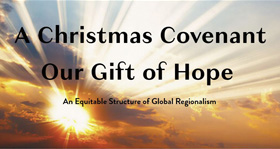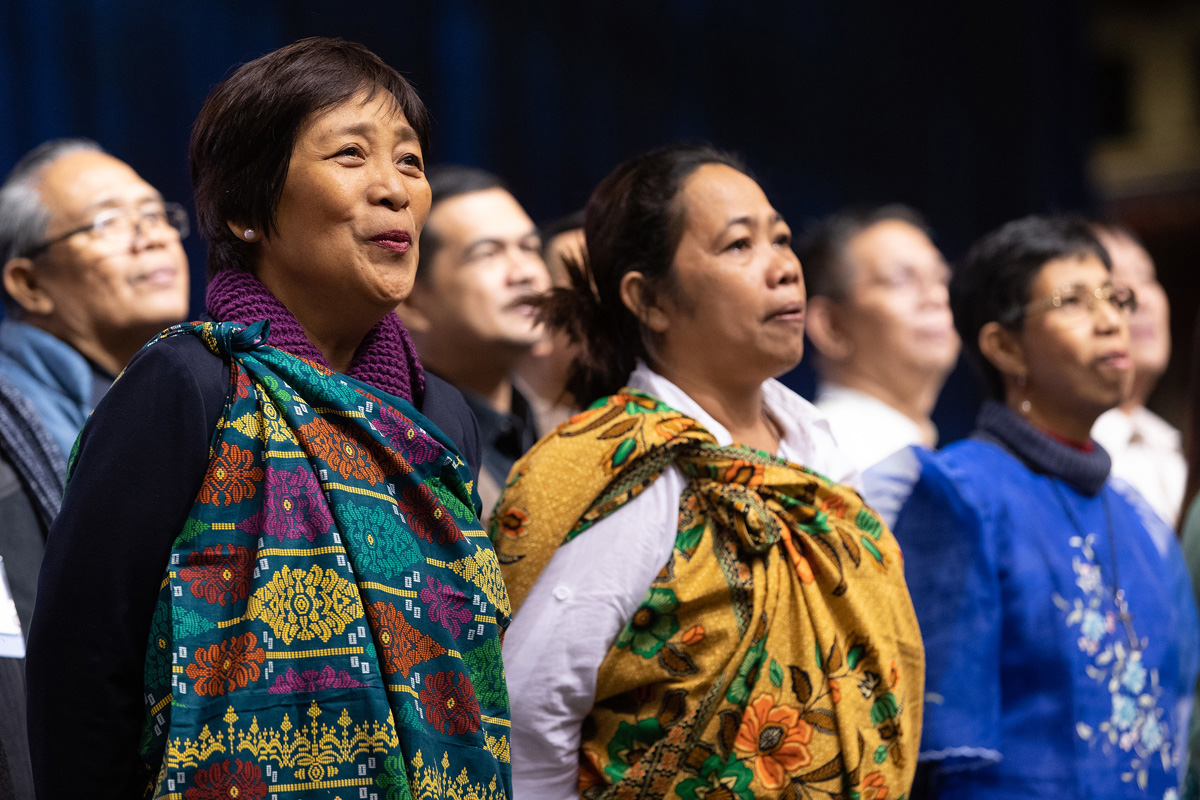Nearly 300 Filipino United Methodists joined a virtual conversation to talk about the Christmas Covenant and other plans for the future of The United Methodist Church.
“Amid uncertainties and predictions on separation and disaffiliation, our unity makes our witness credible,” said Bishop Ciriaco Q. Francisco of the Manila Area during the webinar. “Why should we focus on what divides us?”
He shared why he believes the Christmas Covenant is important for the future of the denomination, noting that it focuses on the fruits of unity, celebrates diversity and “allows each part of the church to offer its best in doing mission and sharing the love of God for all.”
The Christmas Covenant was proposed by General Conference delegates and other United Methodists from the central conferences — church regions in the Philippines, Africa and Europe. Its aim is to keep the denomination intact, but it also calls for restructuring the church into regional conferences, including a U.S. regional conference.
The Filipino session was dubbed “Usapang Bayanihan,” one of the guiding principles in the preamble of the Christmas Covenant. The Filipino concept of “bayanihan” refers to the spirit of communal unity, work and cooperation to achieve a goal.
The five Filipino members of the Christmas Covenant team — Emma Cantor, Karen Prudente and the Revs. Israel Alvaran, Cristine “Tintin” Carnate-Atrero and Jonathan Ulanday — led the conversation during the March 16 webinar.
It was the first in a series of informational sessions focused on the Christmas Covenant. Two meetings for African United Methodists followed, one in English and one in Portuguese. Additional sessions for French-speaking Africans and European delegates are planned for May, Alvaran said.
He said the Filipino session also included information on the Protocol of Reconciliation & Grace Through Separation, a plan negotiated by centrist, progressive and traditionalist United Methodist leaders to end the denomination’s longstanding conflict over how accepting to be of homosexuality.
"In the interest of educating our delegates and members, the first webinar included a presentation of the protocol,” Alvaran said.
The protocol would allow traditionalist churches — those that oppose same-sex weddings and ordination of LGBTQ people as clergy — to leave with their properties. The new group would also get $25 million in United Methodist funds. The protocol sets aside another $2 million for other groups of churches that might leave.
Bishop Rodolfo A. Juan of the Davao Area and the Rev. Egmedio Equila Jr. of the South Nueva Ecija Philippines Conference, both members of the protocol mediation team, led the presentation.
In February 2020, during its regular session, the Philippines Cavite Conference endorsed and sent to the 2020 General Conference legislation for the Protocol of Reconciliation & Grace Through Separation. The conference also endorsed and forwarded the Christmas Covenant.
General Conference has twice been delayed due to the COVID-19 pandemic. It is now scheduled for Aug. 29-Sept. 6, 2022, in Minneapolis.
During the webinar, Francisco said the Christmas Covenant legislation is “our gift to our denomination that, amid uncertainties, we, The United Methodist Church, will stand together. These legislations embody the re-imagining future structure we dream and seek to bridge our divisions, promote equitable relations between all regions of the church and heal spiritual wounds of our people.”
Carnate-Atrero shared the vision and guiding principles of the Christmas Covenant.
“Having been grounded in faith, transformation of the world is our mantra. We still remain steadfast to our mission in whatever circumstance,” she said. “We are all children of God. Christmas Covenant has no right to tell anyone that she or he does not belong. Each one has a rightful place in the table.”
She also emphasized that the context of Filipinos will be highlighted.
“We are tired of (the) U.S. deciding for us. Let us fight for our identity and determination. We are Filipinos,” she said.
Ulanday, from the East Mindanao Philippines Conference, talked about the proposal to move to restructuring into regional conferences.

Nearly 300 Filipino United Methodists joined a virtual conversation to talk about the Christmas Covenant and other plans for the future of The United Methodist Church. It was the first in a series of informational sessions for central conference delegates and church leaders. Logo courtesy of the Christmas Covenant website.
“Recall that this is done to make our mission contextual. The provision entails empowering regional conferences to legislate or to make its own rules, in the condition that may be required by the context,” he said.
Some of the clergy and laity participants sought answers on whether or not there would be a change in church structure, the standard of ordination or LGBTQ stance.
Prudente said the Christmas Covenant expands the Connectional Table proposal for a U.S. Regional Conference by giving it equity that other central conferences already have.
“By creating a regional conference, we decrease the number of days at General Conference by two to three days, which have been used to only discuss USA matters.”
Lloyd Nyarota, a member of the Christmas Covenant team from Zimbabwe, also spoke during the webinar. He said he hopes the events help people understand better the Christmas Covenant.
He said a group of clergy, laity and young people in Africa — some of them General Conference delegates — formed Africa Voice of Unity to promote unity. In February, the group published a statement rejecting the idea of a denominational split.
The group offered support for the Christmas Covenant and other proposals to restructure the denomination and provide regional bodies with more flexibility to adapt church law and decide how to minister in their own context.
“It is our vehicle to promote education via webinars and conversations, in writing statements, articles, building websites and pages on Facebook,” Nyarota said.
During the Filipino session, participants asked in the chat feature about past efforts of the Philippines Central Conference to become autonomous, however, those concerns were not addressed.
“Is this Christmas Covenant about the future of The United Methodist Church?” asked the Rev. Helen Cunanan-Manalac, a former member of the Commission on a Way Forward. “How about the dream of The UMC here in the Philippines to be autonomous, where is that dream now? Are we leaving that dream behind?”
Loida F. Lindo, a United Methodist deaconess, raised similar concerns and asked about getting the information to local churches.
“Has (the Christmas Covenant) been cascaded to local churches and made people understand fully? How about the annual conferences? What is their take on this?”
After the webinar, Bishop Juan said three annual conferences in the Davao Area endorsed the Christmas Covenant: East Mindanao Philippines, Visayas Philippines and Mindanao Philippines. South Nueva Ecija Philippines in the Manila Area also endorsed the legislation.
Mangiduyos is a communicator from the Philippines.
News media contact: Julie Dwyer, newsdesk@umcom.org. To read more United Methodist news, subscribe to the free Daily or Weekly Digests.
Like what you're reading? Support the ministry of UM News! Your support ensures the latest denominational news, dynamic stories and informative articles will continue to connect our global community. Make a tax-deductible donation at ResourceUMC.org/GiveUMCom.




